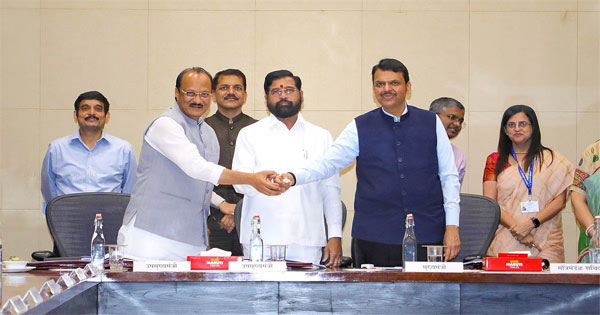Daijiworld Media Network - Mumbai
Mumbai, Aug 26: In a significant policy move, the Maharashtra cabinet led by chief minister Devendra Fadnavis on Tuesday approved the drafting of new Labour Code rules, aligning state labour laws with the Centre’s sweeping labour reforms. This follows the earlier clearance of the Maharashtra Code on Wages Rules, 2025, and the Maharashtra Industrial Relations Code Rules, 2025, bringing the state in sync with the Central Government’s labour codes based on recommendations by the Second National Commission on Labour.
The Commission, formed in 1999 under former Labour Minister Ravindra Varma, proposed consolidating 29 existing labour laws into four comprehensive labour codes to simplify India’s complex labour law landscape.
Apart from labour law reform, the Cabinet cleared several key decisions. These included a streamlined process for issuing identity cards, certificates, and welfare benefits to members of Scheduled Castes and Nomadic Tribes, aimed at improving access to government schemes.

In the irrigation sector, the Cabinet gave the green light for expansion and conversion of three Kolhapur-type dams—Nimgaon, Brahmanath Yelamb (Shirur Kasar), and Takalgaon (Gevrai)—on the Sindafana river in Beed district.
Several major financial approvals were also granted. A working capital loan of Rs 850 crore through the National Cooperative Development Corporation (NCDC) was sanctioned for the Rajgad Cooperative Sugar Factory in Pune’s Bhor taluka, which has political links to ex-Congress MLA Sangram Thopte, now with the BJP. Similarly, a government-backed term loan was approved for the Sangharsh Yoddha Babanrao Dhakne Kedareshwar Cooperative Sugar Factory in Shevgaon, Ahilyanagar, promoted by former Union Minister Babanrao Dhakne.
The Cabinet also approved the sale of land belonging to Yashwant Cooperative Sugar Factory in Theur (Pune) and gave the nod for the development of the Nagpur-Gondia Access Expressway, to be executed by the Maharashtra State Road Development Corporation. Project planning and land acquisition activities were also approved.
In the judicial sector, the Cabinet sanctioned the establishment of a senior civil judge’s court in Ashti, Beed district, with necessary posts and funding arrangements to follow.
Other decisions included amendments to the Maharashtra Public Trusts Act, 1950, and a one-year extension of a special scheme permitting the residential use of vacant leased land in Nagpur and Amravati divisions, continuing the state’s push for land regularisation and urban development.